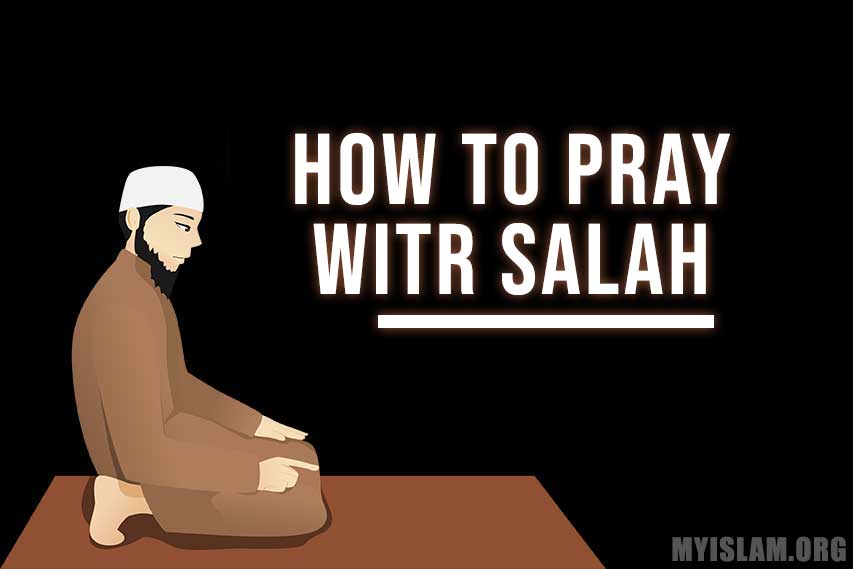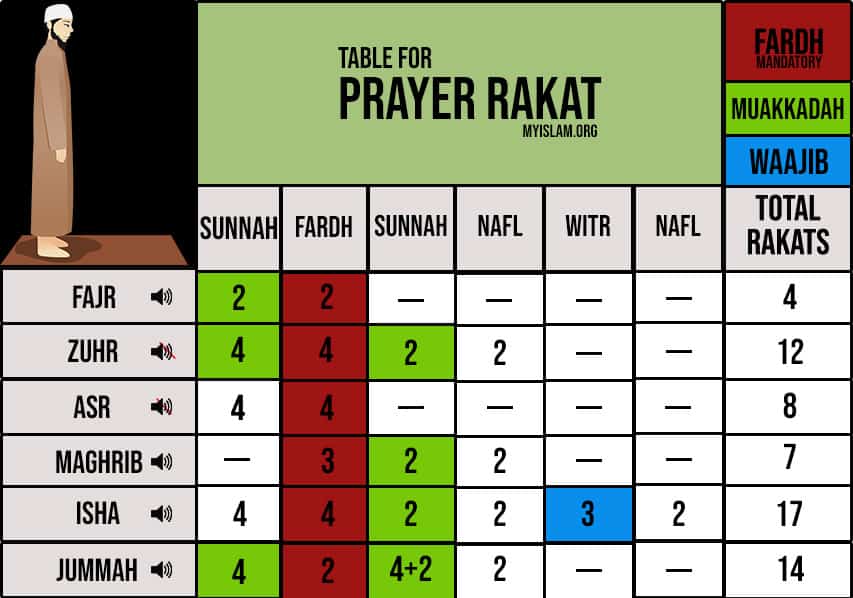Easy to follow step by step guide for a Muslim looking to learn how to properly perform Witr salah according to Quran and Sunnah of the Prophet Muhammad (ﷺ).
Introduction To Witr Prayer
If you’re looking to learn how to pray Witr Salah then you probably know that it is slightly different from the other daily Islamic prayers.
The Witr Salat can be seen as problematic as the Prophet Muhammad (ﷺ) taught us different ways it could be completed. This has led to discussion of which is the right way to pray Witr?
The answer… there actually is no one right way. If there was there would be no discussion or disagreement. The way you may offer Witr prayer depends on which school of Fiqh (Islamic jurisprudence) you follow. All schools of Fiqh are based around Sahih hadith and done according to Quranic teachings, no one school is more correct over another and it’s often a matter of preference.
Another common misconception is the Witr prayer is thought to be part of Isha Salah, this is not entirely correct. Witr prayer can be offered anytime after Isha salah up until break of dawn.
Importance of Witr Salah
Regarding the importance of Witr Salah, in a Sahih hadith, The Prophet (ﷺ) said: The witr is a duty for every Muslim. [1]
As mentioned in our previous guide on how to pray salah, every prayer is an opportunity for a Muslim to invest in deepening his or her relationship with their creator. As kids we may have viewed prayers as a duty or a chore but if we shift our perspective and take the time to understand why we offer prayer then we may be more disciplined and consistent with our prayers.
The Quran teaches us that the prayer can be a source to gain sabr (patience), it is a spiritual act which brings tranquility to the believer’s heart, and is a means of self purification:
“O you who have believed, seek help through patience and prayer. Indeed, Allah is with the patient.”
2:153
“Those who have believed and whose hearts are assured by the remembrance of Allah . Unquestionably, by the remembrance of Allah hearts are assured.”
13:28
“Recite, [O Muhammad], what has been revealed to you of the Book and establish prayer. Indeed, prayer prohibits immorality and wrongdoing, and the remembrance of Allah is greater. And Allah knows that which you do.”
29:45
How Many Rakats in Witr?
The consensus among the jurists is the Witr should be completed in odd number of rakats. This can be three, five, seven, or even nine. The most common practice is to pray three rakats for Witr and there are two ways this can be completed.
1. The first way is to pray three rakat without sitting for tashadud in the second rakat. [2]
2. You can pray two rakat for Witr with tashadud and tasleem. Then follow with one rakat again with tashadud and tasleem. [3]
It is the sunnah of the Prophet Muhammad (blessings and peace be upon him) to pray two by two and finish Witr with one rakah so an odd numbered of rakats is completed. [4] In another hadith it was mentioned that the Prophet prayed five, seven, and even nine rakats in one salat and did not separate them with taslim. [5]
Is Witr Wajib or Sunnah?
There is a difference of opinion as to whether Witr Salat is obligatory.
Wajib – Mandatory prayer, in missing the prayer you are blameworthy. But it is not as bad as missing a Fardh prayer.
Sunnah – Referred to as the Prophet’s practice. Here there are two types, one Rasulullah prayed regularly known as Muakkadah (for example, Eid prayer) and the other which the Prophet abandoned occasionally, Ghair Muakkadah.
According to Imam Abu Hanifah the Witr Salat is considered wajib. The other three imams regard this prayer as Sunnah Al-Muakkadah based off the hadith which stresses that it is not obligatory. [6]
How to Pray Witr (Step By Step):
After going through the prerequisites of Salah we are now ready to begin our prayer. We will demonstrate what offering three rakat witr prayer would look like.
1. Begin with the proper niyyah (intention) that you want to pray salatul witr and decide how many rakat you will offer. This is not mandatory to say but just to give you an idea,
“I intend to offer _____ rakats of the witr prayer.”
2. Pray the first two rakats just like a regular fardh salah. We cover this in our guide to learning how to pray salah. In the third Rakat of Witr prayer recite Surah Fatihah followed by a few verses from the Qur’an, then say the takbir “allahu akbar”. Instead of going down for Ruku raise your hands to your ear lobes and bring them back down to your naval.
3. Here it is Sunnah to recite the witr dua known as qunoot or dua-e-qunoot. There are two variations which are recorded and either is acceptable. [7]
اللَّهُمَّ اهْدِنِي فِيمَنْ هَدَيْتَ وَعَافِنِي فِيمَنْ عَافَيْتَ وَتَوَلَّنِي فِيمَنْ تَوَلَّيْتَ وَبَارِكْ لِي فِيمَا أَعْطَيْتَ وَقِنِي شَرَّ مَا قَضَيْتَ فَإِنَّكَ تَقْضِي وَلاَ يُقْضَى عَلَيْكَ وَإِنَّهُ لاَ يَذِلُّ مَنْ وَالَيْتَ تَبَارَكْتَ رَبَّنَا وَتَعَالَيْتَ
Allahumma ihdini feeman hadayt, wa a’fini fiman afait, wa tawallani fiman tawallait, wa barik Li fima atait, wa qini sharra ma qadait, fa Innaka taqdi wa la yuqda Alaik, wa innahu la yadhillu man walait, tabarakta Rabbana wa ta’alait.
Meaning: O Allah guide me among those You have guided, pardon me among those You have pardoned, befriend me among those You have befriended, bless me in what You have granted, and save me from the evil that You decreed. Indeed You decree, and none can pass decree, and none can pass decree upon You, indeed he is not humiliated whom You have befriended, blessed are You our Lord and Exalted.
The above is generally the more accepted dua for Witr, the Hanafi commonly recite the version below. [8]
اَللَّهُمَّ إنا نَسْتَعِينُكَ وَنَسْتَغْفِرُكَ وَنُؤْمِنُ بِكَ وَنَتَوَكَّلُ عَلَيْكَ وَنُثْنِئْ عَلَيْكَ الخَيْرَ وَنَشْكُرُكَ وَلَا نَكْفُرُكَ وَنَخْلَعُ وَنَتْرُكُ مَنْ ئَّفْجُرُكَ اَللَّهُمَّ إِيَّاكَ نَعْبُدُ وَلَكَ نُصَلِّئ وَنَسْجُدُ وَإِلَيْكَ نَسْعأئ وَنَحْفِدُ وَنَرْجُو رَحْمَتَكَ وَنَخْشآئ عَذَابَكَ إِنَّ عَذَابَكَ بِالكُفَّارِ مُلْحَقٌ
Allahumma inna nasta-eenoka wa nastaghfiruka wa nu’minu bika wa natawakkalu alaika wa nusni alaikal khair, wa nashkuruka wala nakfuruka wa nakhla-oo wa natruku mai yafjuruka, Allah humma iyyaka na’budu wa laka nusalli wa nasjud wa ilaika nas aaa wa nahfizu wa narju rahma taka wa nakhshaa azaabaka inna azaabaka bil kuffari mulhik
Meaning: O Allah! We invoke you for help, and beg for forgiveness, and we believe in you and have trust in you and we praise you, in the best way we can; and we thank you and we are not ungrateful to you, and we forsake and turn away from the one who disobeys you. O Allah! We worship you and prostrate ourselves before you, and we hasten towards you and serve you, and we hope to receive your mercy and we dread your torment. Surely, the disbelievers shall incur your torment.
If you wish to follow the Sunnah of the Prophet you can recite the Witr duas above. But this is not obligatory. You can substitute with any dua if you find the ones above difficult to learn. An easier one to begin with is rabanna atina fid dunya dua. It is, however, recommended to complete Witr according to Sunnah for the most blessings. This includes taking the the time out to memorize the qunut dua.
4. After finishing the invocation, continue with salat in the regular manner and finish with tasleem.
5. For the three rakat of Witr, it is the Sunnah of Prophet Muhammad (ﷺ) to recite Surah Al-A’la (chapter 87) for first rakat, Surah Al Kafirun (chapter 109) in the second, and then Surah Ikhlas (chapter 112) in the final rakat. [9,10] Stress again, this is not mandatory but the Sunnah of the Prophet.
How Witr is performed in Mecca and Medina:
The two harams at Mecca and Medina follow the Shafi’i fiqh which differs in one way.
- The Imam will pray two rakats as usual.
- He then starts a new Salat for one rakat. Reads the Quran aloud and bows for Ruku in the regular manner.
- The imam will say samiallah huliman hamidah and rise from the Ruku. After recitation of rabbana lakal hamd the Imam will raise his hands and begin the supplication.
- The Imam will audibly recite the qunut dua “Allahumma ihdini feeman hadayt…”, the followers behind him in prayer can recite Ameen.
- After the completion of dua-e-qunut, the Imam will complete the salah in the usual manner.
Hadith on Witr Salah:
[1] Narrated Abu Ayyub al-Ansari: The Prophet (ﷺ) said: The witr is a duty for every Muslim so if anyone wishes to observe it with five rak’ahs, he may do so; if anyone wishes to observe it with three, he may do so, and if anyone wishes to observe it with one, he may do so. Grade: Sahih (Al-Albani) Reference: Sunan Abi Dawud
[2] It was narrated that Aisha (may Allah be pleased with her) said: The Messenger of Allah (ﷺ) used to pray Witr with three rak‘ahs, only sitting [for tashahhud] in the last of them. Narrated by al-Bayhaqi (4581). This hadith was classed as sahih by Al-Hakim, and Adh-Dhahabi agreed with him. Al-Mustadrak (1/304). Classed as Sahih by An-Nawawi in Al-Majmoo (4/7).
[3] Narrated from Ibn ‘Umar (may Allah be pleased with him), that he used to separate the two rak’ahs from the single rak’ah with a tasleem, and he said that the Prophet (peace and blessings of Allaah be upon him) used to do that. Narrated by Ibn Hibban (2435); Ibn Hajar said in al-Fath (2/482): its isnad is qawiy (strong).
[4] It was narrated that Ibn Umar said: “The Messenger of Allah (ﷺ) said: ‘Prayer at night is two by two, and witr is one rak’ah.'” Grade: Sahih (Darussalam) Reference: Sunan an-Nasa’i
[5] Mansur reported from Al-Hakam, from Miqsam, from Ibn ‘Abbas that Umm Salamah said: “The Messenger of Allah (ﷺ) used to pray witr with seven or five (rak’ahs), not separating between them with the taslim.” Grade: Sahih (Darussalam) Reference: Sunan an-Nasai
[6] It was narrated that Ali, may Allah (SWT) be pleased with him, said: “Witr is not essential like the obligatory prayers, but it is the sunnah of the Messenger of Allah (ﷺ).” Grade: Sahih (Darussalam) Reference: Sunan an-Nasa’i
[7] Al-Hasan bin Ali [may Allah be pleased with him] said: “Allah’s Messenger taught me some phrases to say during Al-Witr (Allahummahdini fiman hadait, wa a’fini fiman afait, wa tawallani fiman tawallait, wa barik Li fima atait, wa qini sharra ma qadait, fa Innaka taqdi wa la yuqda Alaik, wa innahu la yadhillu man walait, tabarakta Rabbana wa ta’alait.) ‘O Allah guide me among those You have guided, pardon me among those You have pardoned, befriend me among those You have befriended, bless me in what You have granted, and save me from the evil that You decreed. Indeed You decree, and none can pass decree, and none can pass decree upon You, indeed he is not humiliated whom You have befriended, blessed are You our Lord and Exalted.'” Grade: Sahih (Darussalam) Reference: Jami At-Tirmidhi, also mentioned in Sunan Abi Dawud and Sunan Nasai.
[8] Narrated by al-Bayhaqi, 2/210; classed as Sahih by al-Albaani in al-Irwa’, 2/170.
[9] It was narrated from Ibn ‘Abbas that the Messenger of Allah (ﷺ) used to perform Witr and recite: “Glorify the Name of your Lord the Most High,” [Al-A’la (87)] “Say: O you disbelievers!” [Al-Kafirun (109)] and ‘Say: Allah is One.”. [Al-Ikhlas (112)] Another chain with similar wording. Grade: Sahih (Darussalam) Reference: Sunan Ibn Majah
[10] It was narrated that Ubayy bin Ka’b said: “The Messenger of Allah (ﷺ) used to perform Witr and recite: ‘Glorify the Name of your Lord the Most High.’, [Al-A’la (87)] ‘Say: O you disbelievers!” [Al-Kafirun (109)] and ‘Say: Allah is One.”. [Al-Ikhlas (112)] Grade: Sahih (Darussalam) Sunan Ibn Majah









Assalam Alaikum! Very informative section. Thank you for providing very important islamic knowledge.
Very Helpful Thank you
very informative and very comprehensive,may God bless your more & more ameen
At Mecca and Medina Witr Prayer: When starting a new salat after the normal 2 rakats, do we still say the niyat for that particular 1 Witr rakat?
Very helpful jazakallah khair alhamdulillah
AsSalam WaAlaikum,
I’ve been having a lot of personal family issues going on, regarding my mum and her health, pls pray for my mum to get better InshaAllah.
For my Witr, I never forget to pray dua-e-qunoot except tonight. As I was going for sujood I realized i forgot that prayer. Pls advise what I could do for it now and if I catch any mistakes on time on the future.
JazakAllah Khair